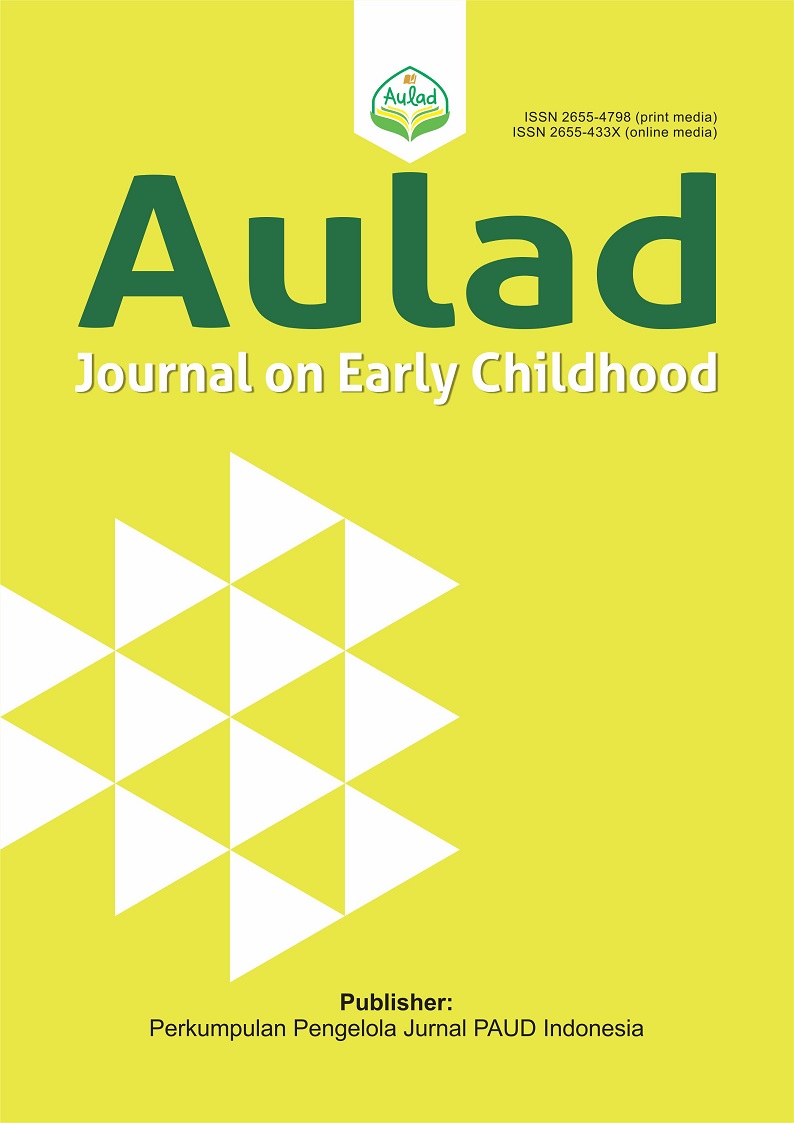Analisis Kompetensi Digital Guru Pendidikan Anak Usia Dini dalam Jabatan (In-Service Teacher)
DOI:
https://doi.org/10.31004/aulad.v5i2.328Keywords:
digital competence, in-service teacher, early childhood educationAbstract
Studi ini bertujuan untuk mengeksplor kemampuan kompetensi digital guru Pendidikan Anak Usia Dini (PAUD) dalam jabatan. Studi ini menggunakan pendekatan kualitatif dengan teknik pengumpulan data menggunakan teknik purposive sampling dengan subjek penelitian berjumlah 5 orang guru PAUD dalam jabatan melalui wawancara one to one dan observasi. Analisis data menggunakan analisis taksonomi. Hasil studi menunjukkan bahwa pada dimensi Information, pemerolehan kebutuhan informasi guru telah efektif, dimensi communication, kompetensi ini intens digunakan terkhusus pada saat pandemi. Dimensi content creation, kemampuan pembuatan dan inovasi konten memerlukan pihak ketiga dan dimensi Safety and Problem Solving, guru telah memiliki kesadaran akan perlindungan data dan privasi diri.
References
Blaiklock, K. (2011). Curriculum guidelines for early literacy: A comparison of New Zealand and England. Australasian Journal of Early Childhood, 36(1), 62—68. Chrisnatalia, S., & Rahadi, D. R. (2020). Komunikasi Digital pada Pembelajaran Secara daring dimasa Pandemi COVID-19. Jurnal BONANZA: Manajemen Dan Bisnis, 1, 56—65. https://doi.org/10.47896/mb.v1i2.289 Creer, A. (2018). Introducing Everyday’digital literacy practices’ into the classroom: An analysis of multi-layered media, modes and their affordances. DEEWR. (2009). Belonging, being & becoming: The early years learning framework for Australia. Department of Education Employment Workplace Relations Commonwealth of Australia Canberra. Dos Reis, T. A. (2018). Study on the alpha generation and the reflections of its behavior in the organizational environment. Quest Journals J Res Humanit Soc Sci, 6, 9—19. Drotner, K. (2020). Children’s digital content creation: Towards a processual understanding of media production among Danish children. Journal of Children and Media, 14(2), 221—236. https://doi.org/10.1080/17482798.2019.1701056 Galindo-DomÃnguez, H., & Bezanilla, M. J. (2021). Digital competence in the training of pre-service teachers: Perceptions of students in the degrees of early childhood education and primary education. Journal of Digital Learning in Teacher Education, 37(4), 262—278. https://doi.org/10.1080/21532974.2021.1934757 Hatlevik, I. K. R. (2017). The impact of prospective teachers’ perceived competence on subsequent perceptions as schoolteachers. Teachers and Teaching, 23(7), 810—828. https://doi.org/10.1080/13540602.2017.1322056 Haydn, T. (2014). How do you get pre-service teachers to become ‘good at ICT’ in their subject teaching? The views of expert practitioners. Technology, Pedagogy and Education, 23(4), 455—469. https://doi.org/10.1080/1475939X.2014.892898 Iordache, C., Mariën, I., & Baelden, D. (2017). Developing digital skills and competences: A quick-scan analysis of 13 digital literacy models. Italian Journal of Sociology of Education, 9(1). Kemdikbud. (2020). Surat Edaran Akun Akses Layanan Pembelajaran bagi Peserta Didik, Pendidik, dan Tenaga Kependidikan. Kemdikbud. Kemdikbud. (2021). Digitalisasi Sekolah, Metode Pembelajaran di Era Revolusi Industri 4.0. Jendela Pendidikan Dan Kebudayaan. https://jendela.kemdikbud.go.id/ Kirtiklis, K. (2017). Manuel Castells’ theory of information society as media theory. Lingua Posnaniensis, 59, 65—77. https://doi.org/10.1515/linpo-2017-0006 Krumsvik, R. J. (2014). Teacher educators’ digital competence. Scandinavian Journal of Educational Research, 58(3), 269—280. Lázaro-Cantabrana, J., Usart-RodrÃguez, M., & Gisbert-Cervera, M. (2019). Assessing Teacher Digital Competence: The Construction of an Instrument for Measuring the Knowledge of Pre-Service Teachers. Journal of New Approaches in Educational Research (NAER Journal), 8(1), 73—78. MartÃn, S. C., González, M. C., & Peñalvo, F. J. G. (2020). Digital competence of early childhood education teachers: Attitude, knowledge and use of ICT. European Journal of Teacher Education, 43(2), 210—223. https://doi.org/10.1080/02619768.2019.1681393 Masoumi, D. (2021). Situating ICT in early childhood teacher education. Education and Information Technologies, 26(3), 3009—3026. https://doi.org/10.1007/s10639-020-10399-7 Noor, M. U. (2020). Hubungan Tingkat Pendidikan Generasi Milenial Terhadap Upaya Perlindungan Privasi Dan Data Pribadi Di Internet. BIBLIOTIKA: Jurnal Kajian Perpustakaan Dan Informasi, 4(2), 154—163. Olofsson, A. D., Fransson, G., & Lindberg, J. O. (2020). A study of the use of digital technology and its conditions with a view to understanding what ‘adequate digital competence’ may mean in a national policy initiative. Educational Studies, 46(6), 727—743. https://doi.org/10.1080/03055698.2019.1651694 Redecker, C. (2017). European framework for the digital competence of educators: DigCompEdu. Joint Research Centre (Seville site). Setiarso, B., & Triyono, T. (1997). Sumber-sumber Informasi Indonesia dan Pengembangan Pangakalan Daya di Internet. Jurnal Dokumentasi Dan Informasi, 21(6), 2—9. Silvana, H., Rullyana, G., & Hadiapurwa, A. (2019). Kebutuhan Informasi Guru Di Era Digital: Studi Kasus Di Sekolah Dasar Labschool Universitas Pendidikan Indonesia. Baca: Jurnal Dokumentasi Dan Informasi, 40(2), 147—158. Spante, M., Hashemi, S. S., Lundin, M., & Algers, A. (2018). Digital competence and digital literacy in higher education research: Systematic review of concept use. Cogent Education, 5(1), 1519143. https://doi.org/10.1080/2331186X.2018.1519143 Spielman, A. (2021). The Annual Report of Her Majesty’s Chief Inspector of Education, Children’s Services and Skills 2020/21. Tomczyk. (2019). Digital literacy in the area of e-safety among teachers (second stage of the primary school) in Poland. Conference Proceedings Of » ELearning and Software for Education «(ELSE), 15(02), 130—135. Tomczyk, L. (2019). What Do Teachers Know About Digital Safety? Computers in the Schools, 36(3), 167—187. Turja, L., Endepohls-Ulpe, M., & Chatoney, M. (2009). A conceptual framework for developing the curriculum and delivery of technology education in early childhood. International Journal of Technology and Design Education, 19(4), 353—365. Utami, I. H., & Hasanah, A. (2020). Kompetensi profesional guru dalam penerapan pembelajaran tematik di SD Negeri Maguwoharjo 1 Yogyakarta. Pionir: Jurnal Pendidikan, 8(2). Warschauer, M. (2004). Technology and social inclusion: Rethinking the digital divide. MIT press.
Downloads
Published
How to Cite
Issue
Section
Citation Check
License
Authors who publish with this journal agree to the following terms:
- Authors retain copyright and grant the journal right of first publication with the work simultaneously licensed under a Creative Commons Attribution-ShareAlike 4.0 International License that allows others to share the work with an acknowledgement of the works authorship and initial publication in this journal.
- Authors are able to enter into separate, additional contractual arrangements for the non-exclusive distribution of the journals published version of the work (e.g., post it to an institutional repository or publish it in a book), with an acknowledgement of its initial publication in this journal.
- Authors are permitted and encouraged to post their work online (e.g., in institutional repositories or on their website) prior to and during the submission process, as it can lead to productive exchanges, as well as earlier and greater citation of published work (See The Effect of Open Access).











 How to Submission
How to Submission